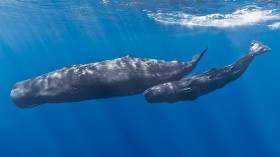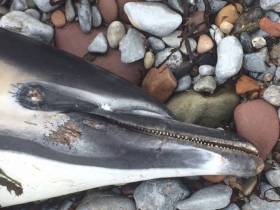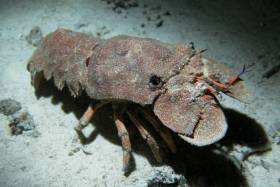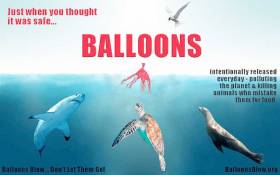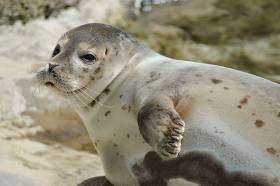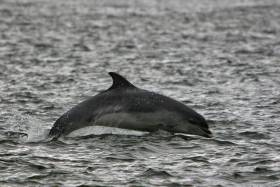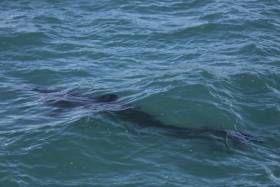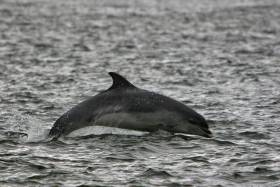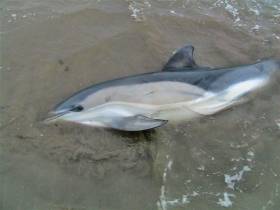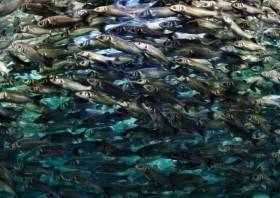Displaying items by tag: marine wildlife
Sperm Whale Carcass Washes Up On Wexford Beach
#MarineWildlife - The carcass of an 11-tonne sperm whale has washed up at Carnsore Point in Co Wexford, as the Gorey Guardian reports.
The 8.5m whale — discovered by local man Davie Rea on the rocky shore at the end of last week — was identified as an adult female by the Irish Whale and Dolphin Group (IWDG).
Kevin MacCormick of the IWDG added that the giant marine mammal appeared to be emaciated “so most likely it was not in good health”.
It’s been five years since the last sperm whale stranding on the Wexford coast, as the species is more often found in western waters.
The Gorey Guardian has more on the story HERE.
2017 ‘Worst Year On Record’ For Whale & Dolphin Strandings
#MarineWildlife - Not even two months in and 2017 is already the worst year on record for whale and dolphin strandings, according to the Irish Whale and Dolphin Group (IWDG).
As of Friday 17 February, a whopping 56 cetacean standings had been recorded — more than half of them identified as common dolphins.
Prior to 2010, the average numbers of standings were around 22, of which five would have been common dolphins, says the IWDG’s strandings officer Mick O’Connell.
The question of what is happening to cause such a spike in strandings throughout this decade prompted a meeting between the IWDG, Government agencies and representatives from Irish and European fishing fleets earlier this week.
“There is a disconnect somewhere,” says O’Connell, “as internationally accepted visual evidence of bycatch is seen in some strandings, and post-mortem reports on five common dolphins in Mayo in 2013 reported that their deaths were likely to be due to bycatch in a pelagic trawl net, yet Irish and EU observer schemes involving pelagic trawlers reported no bycatch in commercial pelagic hauls.”
The latest stranding was recorded in Fenit, Co Kerry on Wednesday (15 February) — a dolphin alleged by locals to have been caught in the nets of a large trawler offshore before being dumped overboard, as the Irish Mirror reports.
The Irish Examiner adds that another common dolphin with blood marks was found at Ballyconneely Beach in Connemara on the same day, while two days previous the emaciated carcass of a sperm whale was found on Nethertown Beach at the most south-easterly point of Co Wexford.
Last month, a spate of marine wildlife standings on the Waterford coast was blamed on pair trawling activity in the area.
Rare Slipper Lobster Found Off Aran Islands
#MarineWildlife - The Galway Atlantaquaria is currently caring for an extremely rare slipper lobster found in Galway Bay off the Aran Islands in recent days.
According to the Marine Institute, this is the first recorded landing of the warm ocean species at this latitude in the North Atlantic, after previous reports Kerry and Cork in the last decade.
The latest find was landed by skipper John Connolly of the fishing vessel Connacht Ranger from Kilronan on Inis Mór, and landed into Rossaveal, where it was later identified by Terlich Smith of the Marine Institute.
"My nieces and nephews were very excited about the slipper lobster, and named it Tréan, which is an old Irish word for hardy and brave and usually associated with warriors,” said Connolly.
“The fact it was so small, came so far north, and survived being towed up in a big net full of spurdogs, stones and prawns does make the name seem pretty apt.”
The Galway Atlantaquaria is now caring for the 72mm exotic lobster, which is progressing well after a week in quarantine.
Horrific Damage to Marine Wildlife
There are photographs on marine animal welfare websites which show the awful horror and terrible suffering which balloon and lantern releases into the air have caused to marine wildlife. If you saw or see them, you would never again let a balloon blow away towards the sky. Those photographs certainly made a huge impression on me as did Niall Hatch, Development Officer with Birdwatch when he came on the programme this week with a plea to all listeners – even though it may be done with the best of intentions, please stop releasing balloons into the air, because that act is killing seabirds and marine wildlife. The country’s marine animal welfare organisations are all backing this plea.
Do listen to Niall, hearken to his words and take action…..
On THIS ISLAND NATION we bring you stories that you won’t hear on any other radio station…. There hasn’t been much reporting that it rains in Antarctica, the Continent of snow and ice where it is now Summertime… And that rain is killing penguins who are used to the cold temperatures but not to being wet….Donald Trump doesn’t believe in climate change… He should listen to those with first-hand experience, like Jim Wilson, the respected Irish ecologist and ornithologist, just back from a trip down there and about to return to the area… Climate change is a hard-sell, he says, but it is happening. It’s difficult to imagine perhaps, but it is a sign of climate change – rain in Antarctica.. Weather is what we experience every day, climate is the long-term change in weather. On our last programme Jim revealed that it was an Irishman, Edward Bransfield, who first set eyes on Antarctica. That story has brought a big response from listeners, so progress is being made on the plan to build a monument to honour Bransfield, even if Russia’s Vladimir Putin may try to claim territorial rights in Antarctica. He could face a tough job to beat the people of Cork Harbour!
The Government’s plans to protect and develop rural communities will, it is hoped, include the coastal communities and should include the offshore island communities which are an essential part of Ireland’s maritime history and culture. Rhoda Twombly, Secretary of the Islands’ Federation, Comhdháil Oileán na hÉireann, brings us the latest news from the islands, which include a new college on Inishmaan and developments in the arts on Inisheer. She also reveals why the people of Inishbofin Island are scouring the world for ‘yarn bombs’!
“Boating is for everybody.” I liked those words from Martin Ryan, Chairman of Meitheal Mara, Cork City’s community boatyard and maritime heritage voluntary organisation which has launched an ambitious €5m. ‘Strategic Plan’ to create “an integrated maritime hub” on Leeside. He accepts that it will take some time, maybe as much as five years to achieve, but says the organisation is determined to do this. He makes good points about how our rivers belong to everyone and how building a boat to use on them can be a life-changing experience.
Salmon anglers were not happy in the month of January when, for the first time, no Spring salmon were caught, though this changed this month. Myles Kelly of Inland Fisheries Ireland reports the story for THIS ISLAND NATION.
Enjoy the programme below.
Seal Rescue Centre Seeks Sponsors
#MarineWildlife - The Seal Rescue Centre in Courtown is appealing for new sponsors to fund supplies for the marine wildlife in its care, as the Gorey Guardian reports.
The sanctuary recently took on its first sponsor in Gorey’s Amber Springs Hotel, which now has its name displayed over one of the 12 kennels available.
More than 60 seals are being kept at the Co Wexford centre that has a busy winter period taking in rescued seals and seal pups, the latest of them brought in from Clogherhead in Co Louth at the end of January.
But the Seal Rescue Centre is also celebrating successful releases back into the wild of seals it has treated — like Nala, an orphaned seal found in distress at Union Hall in West Cork last October, according to the Southern Star.
NI Scientists Head Whale & Dolphin ‘Listening’ Project
#MarineScience - Scientists from Northern Ireland will lead a new project monitoring whale and dolphin sounds off the Scottish and Irish coasts, as BBC News reports.
The scheme led by the Agri-Food and Biosciences Institute (AFBI) will see a network of buoys deployed with devices to pick up cetacean chatter – as well as potentially harmful ocean sounds from sea traffic or industry.
"Displacement from noise is a very real effect and ... if it doesn't cause them to move will change their behaviours and, at the most acute levels, can cause physical and physiological damage to the animals,” says Dr Adam Mellor of the AFBI.
BBC News has more on the story HERE.
Half Of Europe’s Shark Species Found In Irish Waters
#MarineWildlife - A whopping 71 species of shark can be found swimming in Irish waters.
That’s according to the new New Red List of Cartilaginous Fish, as reported by TheJournal.ie, which adds that half of all sharks in Europe can be found swimming around the Irish coast.
Eleven of these species are classified as either ‘endangered' ’critically endangered’, such as the porbeagle shark, the Portuguese dogfish and the basking shark — the second-largest fish in the oceans and a frequent visitor to Irish inshore waters.
The Red List comes hot on the heels of a new atlas of Ireland’s wildlife that’s dominated by whales and dolphins, as previously reported on Afloat.ie.
And it also notes that outside of Ireland, where angling for such species is predominantly catch-and-release, recreational fishing poses a growing threat to cartilaginous fish like sharks, skates and rays.
TheJournal.ie has more on the story HERE.
Whales & Dolphins Dominate New Atlas Of Irish Mammals
#MarineWildlife - Ireland’s whales and dolphins feature in a new atlas of the country’s wildlife, as The Irish Times reports.
The Atlas of Mammals in Ireland 2010-2015, published by the National Biodiversity Data Centre, maps the distribution of 77 mammal species both on the island and in its territorial waters.
Cetaceans account for almost a third of this number, among a whopping 68 species of whales and dolphins that frequent Irish waters.
The Irish Whale and Dolphin Group’s Dr Simon Berrow relates his long-term study of the Shannon Estuary’s thriving population of bottlenose dolphins in a book that celebrates an encouraging national habitat for species that struggle not so far from our shores.
Afloat.ie readers might remember a previous atlas concentrating on Ireland’s abundance of marine mammals that was published in 2013, and for which this new book makes a useful comparison.
Common Dolphins Strand In Dungarvan
#MarineWildlife - The Irish Whale and Dolphin Group reports on the stranding of three common dolphins in Dungarvan at the weekend.
Two of the three dolphins were still alive when found on Friday (13 January), though they were in “poor condition”, and one was later confirmed dead. The other was last seen in the area on Saturday and its current status is unconfirmed.
The news comes just days after two common dolphins were refloated after stranding in Tarbert, Co Kerry, as previously reported on Afloat.ie.
It also follows a spate of marine wildlife deaths on the Waterford coast during the week, incidents that have been blamed on pair trawling activity.
Waterford Marine Wildlife Deaths Blamed On Pair Trawling
#PairTrawling - Winter season pair trawling has been blamed for a spate of marine wildlife deaths on the Waterford coast this week, as the Irish Examiner reports.
Locals in Ardmore discovered four seals and a porpoise washed up on their beach this past Wednesday (11 January).
At least one of the seals was photographed with what appeared to be fishing net entangled around its snout.
Seals and cetaceans including humpback whales have been spotted off the South Coast in big numbers this month, likely following shoals of herring — also a popular fish for pair trawling, a fishing practice criticised by environmentalists for its threat to inshore marine wildlife.
Pair trawling was the subject of a debate on RTÉ Radio 1’s Countrywide last month, as previously reported on Afloat.ie.



























